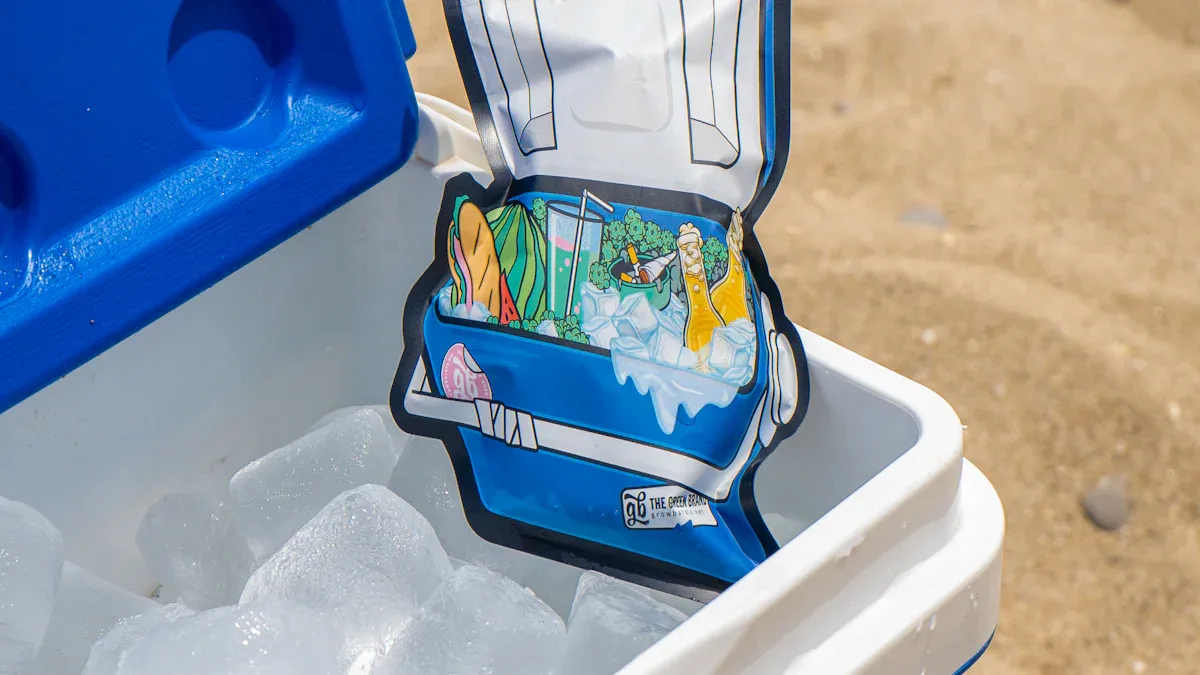
Portable car fridges have revolutionized the way travelers store food and beverages during road trips and outdoor adventures. These outdoor refrigerators are designed to maintain consistent cooling, making them essential for camping, picnics, and extended drives. With the rise in outdoor recreational activities and advancements in refrigeration technology, their popularity continues to grow. As more individuals embrace RV living and van life, portable refrigerators offer dependable cooling solutions for keeping food fresh. These mini fridge freezers not only provide unmatched convenience but also ensure food safety, promoting healthier eating habits while on the move.
What Are Portable Car Fridges?
Definition and Purpose
A portable car fridge is a compact refrigeration unit designed for use in vehicles. It operates using a vehicle’s power supply or alternative energy sources like solar panels. Unlike traditional coolers that rely on ice, these fridges provide consistent cooling through advanced technologies such as thermoelectric or compressor systems. Their primary purpose is to keep food, beverages, and other perishables fresh during travel. This makes them an essential tool for outdoor enthusiasts, long-distance drivers, and anyone seeking convenience on the road.
The growing demand for portable car fridges reflects their practicality. The global car refrigerator market, valued at over USD 558.62 million in 2024, is projected to exceed USD 851.96 million by 2037. This steady growth, with a CAGR of 3.3% from 2025 to 2037, underscores their increasing popularity among travelers.
Common Uses for Travelers
Portable car fridges serve a variety of purposes for travelers. They are indispensable for camping trips, where maintaining food safety is crucial. A survey of 15,000 camping enthusiasts revealed that 90% consider portable refrigeration essential. These fridges also enhance the experience of RV living, with over 850,000 RVs in the U.S. equipped with compact cooling units as of early 2024.
Festival-goers in Europe frequently use portable fridges to store snacks and drinks, with over 150 musical events promoting efficient gear. Similarly, hikers and outdoor adventurers benefit from these devices. In Canada, 80,000 units were sold in early 2024, driven by innovations like solar-charging solutions. The versatility of portable car fridges makes them a valuable asset for various travel scenarios.
Types of Portable Car Fridges
Thermoelectric Models
Thermoelectric models use the Peltier effect to provide cooling. These devices operate without moving parts, making them durable and quiet. They are environmentally friendly since they do not use harmful refrigerants. Thermoelectric coolers (TECs) are ideal for personalized cooling needs and can achieve higher efficiency under specific conditions.
- Key Features:
- Compact and lightweight design.
- Operates efficiently in moderate ambient temperatures.
- Produces no emissions, aligning with eco-friendly practices.
However, thermoelectric models may struggle in extreme heat, as their cooling efficiency depends on the surrounding temperature. They are best suited for short trips or mild climates.
Compressor Models
Compressor models rely on traditional compressor technology to achieve precise cooling. These fridges can maintain temperatures ranging from -18 to 10 degrees Fahrenheit, making them suitable for freezing and refrigeration. DC compressor models, in particular, stand out for their energy efficiency, achieving up to 91.75% efficiency.
- Advantages:
- High cooling efficiency, capable of making ice.
- Compatible with solar panels, enhancing green energy applications.
- Large capacity, suitable for extended trips.
Despite their benefits, compressor models are heavier and consume more power than other types. They are ideal for travelers requiring reliable cooling for longer durations.
Ice Coolers and Hybrids
Ice coolers and hybrid models combine traditional insulation with modern cooling technologies. While ice coolers rely solely on insulation, hybrid models integrate compressor or thermoelectric systems for enhanced performance.
| Type | Cooling Method | Temperature Range | Advantages | Disadvantages |
|---|---|---|---|---|
| Cooler | Insulation only | N/A | Low cost, no electricity consumption | Limited cooling time, small capacity |
| Semiconductor Refrigerator | Peltier effect | 5 to 65 degrees | Environmentally friendly, low noise, low cost | Low cooling efficiency, affected by ambient temp |
| Compressor Refrigerator | Traditional compressor technology | -18 to 10 degrees | High cooling efficiency, can make ice, large capacity | Higher power consumption, heavier |
Hybrid models like the ARB fridge offer rapid cooling, reaching 35 degrees in just 20 minutes. However, they cannot refrigerate and freeze simultaneously. These models cater to users seeking a balance between cost and performance.
Benefits of Portable Car Fridges

No Need for Ice
One of the most significant advantages of a portable car fridge is its ability to eliminate the need for ice. Traditional coolers rely on ice to maintain low temperatures, which can be inconvenient and messy as the ice melts. Portable car fridges, however, use advanced cooling technologies to keep food and beverages fresh without requiring ice. This feature not only saves space but also ensures that items remain dry and uncontaminated.
Performance tests highlight the efficiency of these fridges in maintaining low temperatures. For instance, a compressor model reached -4°F in under two hours during a maximum rate freeze test, consuming only 89 watt-hours of power. At a steady state of 37°F, the fridge averaged just 9 watts, demonstrating its energy efficiency.
| Test Condition | Result | Power Consumption |
|---|---|---|
| Maximum Rate Freeze | Reached -4°F in 1 hour, 57 mins | 89.0 Watt-hours |
| Steady State Usage at -4°F | 20.0 watts average over 24 hrs | 481 Whr |
| Steady State Usage at 37°F | 9.0 watts average | N/A |
By eliminating the need for ice, travelers can enjoy more storage space and avoid the hassle of constantly replenishing ice supplies. This makes portable car fridges a practical choice for extended trips and outdoor adventures.
Consistent Cooling
Portable car fridges provide consistent cooling, ensuring that food and beverages remain at the desired temperature regardless of external conditions. Unlike traditional coolers, which can struggle to maintain low temperatures in hot weather, these fridges use advanced technologies like compressors or thermoelectric systems to deliver reliable performance.
This consistency is particularly beneficial for travelers who need to store perishable items such as dairy products, meats, or medications. The ability to maintain a steady temperature prevents spoilage and ensures food safety. Additionally, the precise temperature control offered by these fridges allows users to customize settings based on their specific needs, further enhancing their utility.
Adjustable Temperature Settings
Another key benefit of portable car fridges is their adjustable temperature settings. These fridges often feature digital controls or mobile app integration, allowing users to set and monitor temperatures with ease. This flexibility makes them suitable for a wide range of applications, from keeping beverages chilled to freezing perishable goods.
For example, some models offer dual-zone functionality, enabling simultaneous cooling and freezing in separate compartments. This feature is particularly useful for travelers who need to store different types of items at varying temperatures. The ability to adjust settings on the go ensures that users can adapt to changing needs during their journey, making portable car fridges a versatile and user-friendly option.
Portability and Convenience
Designed with travelers in mind, portable car fridges prioritize portability and convenience. Features such as removable doors, off-road wheels, and extendable handles make these fridges easy to transport, even in rugged outdoor environments. Their compact design allows them to fit seamlessly into vehicles, maximizing space efficiency.
Users also appreciate the convenience of modern features like app-based temperature control, which enables real-time adjustments from a smartphone. This level of control enhances the overall travel experience, ensuring that food and beverages are always stored at optimal conditions.
- Key Benefits of Portability and Convenience:
- Lightweight and compact design for easy transport.
- Dual-zone functionality for simultaneous cooling and freezing.
- App-based controls for real-time temperature adjustments.
Whether for road trips, camping, or other outdoor activities, portable car fridges offer unmatched convenience and reliability. Their user-friendly features and ergonomic design make them an indispensable tool for modern travelers.
Drawbacks of Portable Car Fridges
High Cost
Portable car fridges often come with a high price tag, making them a significant investment for travelers. The advanced cooling technologies, durable materials, and compact designs contribute to their elevated costs. While these features enhance performance and longevity, they also make these fridges less accessible to budget-conscious consumers.
Market research highlights that the automotive portable refrigerator market faces challenges due to price competition from local manufacturers in regions like South and East Asia. These manufacturers offer lower-cost alternatives, creating a competitive landscape that disrupts the revenues of global players. Despite their benefits, the high cost of portable car fridges remains a barrier for many potential buyers, particularly those who travel infrequently or have limited budgets.
Power Dependency
Unlike traditional coolers, portable car fridges rely on a consistent power source to operate. This dependency can pose challenges for travelers venturing into remote areas with limited access to electricity. Most models connect to a vehicle’s power supply, which means they require the engine to run or an alternative energy source, such as a solar panel or portable battery.
This reliance on power can limit their usability in certain scenarios. For instance, extended camping trips in off-grid locations may require additional equipment to ensure uninterrupted operation. Travelers must carefully plan their energy needs to avoid disruptions, which adds another layer of complexity to their journey.
Energy Consumption
Portable car fridges, especially compressor models, consume a considerable amount of energy to maintain consistent cooling. While advancements in energy efficiency have reduced power usage in recent years, these devices still require more energy than traditional ice coolers. This can lead to higher fuel consumption for vehicles or increased reliance on external power sources.
Reports indicate that significant power requirements hinder the growth of the portable fridge market. Travelers must weigh the benefits of reliable cooling against the potential increase in energy costs. For eco-conscious individuals, the environmental impact of higher energy consumption may also be a concern.
Battery Drain Risks
One of the most critical drawbacks of portable car fridges is the risk of draining a vehicle’s battery. When connected to a car’s power supply, these fridges can deplete the battery if the engine is not running. This risk becomes more pronounced during extended stops or overnight use.
To mitigate this issue, many modern models include low-voltage protection features that automatically shut off the fridge when the battery reaches a critical level. However, not all units offer this functionality, leaving some travelers vulnerable to unexpected battery failures. Proper planning and the use of auxiliary power sources can help reduce this risk, but it remains a factor that users must consider.
Comparing Cooling Options

Portable Car Fridges vs. Ice Coolers
Portable car fridges and ice coolers differ significantly in cooling efficiency and convenience. Electric coolers, including portable refrigerators, outperform traditional ice coolers in cooling capabilities. They can achieve temperatures as low as -4°F, while ice coolers rely on melting ice to maintain lower temperatures. This makes portable fridges ideal for storing perishable items like meat and dairy during long trips.
Performance benchmarks highlight the advantages of portable car fridges in power efficiency, cooling speed, and temperature retention. Unlike ice coolers, which require frequent ice replenishment, portable fridges operate using various power sources, including solar panels. This versatility makes them suitable for extended outdoor adventures. However, ice coolers remain a cost-effective option for short trips, offering durability and simplicity without the need for electricity.
Portable Car Fridges vs. Traditional Refrigerators
Portable car fridges offer mobility and adaptability that traditional refrigerators cannot match. While traditional refrigerators provide consistent cooling in fixed locations, portable fridges are designed for travel. They run on 12V DC power, 110V AC, or solar energy, making them compatible with vehicles and off-grid setups.
| Category | Portable Refrigerator | Traditional Ice Chest |
|---|---|---|
| Power Demands | Runs on 12V DC, can also use 110V AC or solar power. | Requires no power source, completely self-contained. |
| Durability | Built for off-road travel but has sensitive electronic components. | Extremely durable, often doubles as seating, no moving parts to fail. |
| Cost | Initial investment is higher ($500 to $1500), with potential additional costs. | Lower upfront cost ($200 to $500), but ongoing ice expenses can add up. |
| Convenience | Very convenient, no need to manage ice, food stays dry and organized. | Requires more management, needs regular ice replenishment and draining. |
Portable fridges also feature adjustable temperature settings, allowing users to freeze or refrigerate items simultaneously. Traditional refrigerators lack this flexibility, making portable fridges more suitable for travelers seeking convenience and efficiency.
Best Use Cases for Each Option
Each cooling option serves distinct purposes based on travel needs. Portable car fridges excel in scenarios requiring consistent cooling for extended periods. They are ideal for camping trips, RV living, and long-distance drives where food safety is a priority. Their ability to maintain precise temperatures makes them indispensable for storing medications and perishables.
Ice coolers, on the other hand, are better suited for short outings or budget-conscious travelers. Their durability and low cost make them a practical choice for picnics, day hikes, and festivals. For those seeking a balance between cost and performance, hybrid models combine the benefits of both technologies, offering rapid cooling without the need for constant power.
Tip: Travelers should assess their specific needs, trip duration, and budget before choosing between these cooling options.
Choosing the Right Portable Car Fridge
Travel Needs and Frequency
Selecting the right portable car fridge depends heavily on travel habits. Frequent travelers, such as road trip enthusiasts or outdoor adventurers, benefit from durable models with advanced cooling capabilities. Families commuting daily or embarking on weekend getaways may prefer compact fridges that prioritize convenience and portability.
A study of consumer segments highlights varying needs:
| Consumer Segment | Key Insights |
|---|---|
| Outdoor Enthusiasts | 45% of camping households own a cooler or fridge designed for vehicle use. |
| Road Trip Travelers | 70% prefer road trips over flying, making automotive fridges essential for convenience. |
| Commercial Vehicle Operators | Refrigerated transport has grown by 4% annually, indicating a strong demand for portable fridges. |
| Families and Everyday Commuters | 60% of families are interested in portable cooling appliances for healthier eating on-the-go. |
| Electric Vehicle Users | Sales of EV-specific automotive fridges rose by 35% last year, reflecting changing consumer needs. |
| Urban Dwellers | 20% of millennials use ride-sharing services, increasing demand for versatile cooling solutions. |
Understanding travel frequency and lifestyle ensures the fridge aligns with specific needs, maximizing its utility.
Vehicle Power Setup
A proper vehicle power setup is crucial for operating a portable car fridge efficiently. Travelers must evaluate their vehicle’s battery capacity and consider options to prevent excessive discharge.
- Key Considerations:
- Vehicle Battery: Avoid draining the main battery to prevent starting issues.
- Dual Battery System: A secondary battery dedicated to the fridge minimizes risks.
- Solar Power: Renewable energy solutions provide eco-friendly options for extended trips.
These setups enhance reliability, ensuring uninterrupted cooling during long journeys.
Budget Considerations
Budget plays a significant role in choosing a portable car fridge. High-end models offer advanced features like dual-zone cooling and app-based controls but come at a premium. Budget-conscious travelers may opt for simpler designs that balance cost and performance.
Evaluating the frequency of use and specific requirements helps determine whether investing in a high-performance model is justified. For occasional use, mid-range options often provide sufficient functionality without straining finances.
Size and Capacity
The size and capacity of a portable car fridge should match the duration of trips and the number of users. Compact models suit solo travelers or short outings, while larger fridges accommodate families or extended expeditions.
- Weekend trips (1-3 days): A compact fridge, around 30-50 liters, is usually enough.
- Moderate trips (4-7 days): A mid-sized fridge, around 50-80 liters, offers better storage.
- Long expeditions (8+ days): A larger fridge, 80-125 liters, ensures you won’t run out of fresh food and drinks.
For group travel, a fridge with a capacity of 125 liters or more is recommended to meet the needs of multiple people. Choosing the right size ensures optimal storage without wasting space or energy.
Portable car fridges continue to gain popularity among travelers due to their convenience and reliable cooling capabilities. The market for these devices is projected to grow significantly, reaching USD 2.8 billion by 2032, driven by increasing demand for efficient refrigeration solutions in outdoor activities. Technological advancements, such as energy-efficient models, further enhance their appeal. While these fridges offer numerous benefits, travelers must evaluate their needs carefully to select the most suitable option. A thoughtful approach ensures a balance between functionality and cost, helping users make informed decisions.
FAQ
What is the average lifespan of a portable car fridge?
Most portable car fridges last 5-10 years with proper maintenance. Regular cleaning and avoiding overloading can extend their lifespan.
Can portable car fridges run on solar power?
Yes, many models support solar power. Users must ensure compatibility with solar panels and consider battery storage for uninterrupted operation during cloudy weather.
Are portable car fridges noisy during operation?
Compressor models produce minimal noise, typically under 45 decibels. Thermoelectric models are quieter due to their lack of moving parts, making them suitable for peaceful environments.
Post time: May-12-2025

